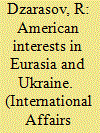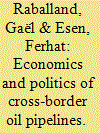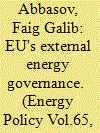|
|
|
Sort Order |
|
|
|
Items / Page
|
|
|
|
|
|
|
| Srl | Item |
| 1 |
ID:
144965


|
|
|
|
|
| Summary/Abstract |
WASHINGTON'S FOREIGN POLICY has played and continues to play one of the main roles in the international political and military crises in Ukraine, in the way they began and are unfolding. The American ruling circles spent twenty-five post-Soviet years tightening their grip on Ukraine and its people through a network of institutions ranging from the oligarchs with money in Western banks and numerous NGOs to rigidly controlled political parties and neo-fascist fighters - thrown into action at the opportune moment to bring a pro-American regime to power.
|
|
|
|
|
|
|
|
|
|
|
|
|
|
|
|
| 2 |
ID:
077402


|
|
|
|
|
| Publication |
2007.
|
| Summary/Abstract |
The construction of cross-border pipelines requires large upfront investment and, because of transit through third countries, is subject to increased risk. We demonstrate that the decision to build cross-border pipelines in landlocked regions is influenced more by economics than by politics. Governments use transportation constraints to discriminate among foreign oil companies and to promote low-efficiency routes for political purposes. This paper describes strategies used by importers and oil majors to address this limitation, using the Caspian basin as a reference. Based on data obtained from oil professionals operating in the region, and professional journals, we highlight that, on average, transportation costs in the Caspian basin are up to six times higher than in the other oil-producing regions of the world.
This paper does not reflect opinions and views of EBRD. The authors would wish to thank Yelena Kalyuzhnova, Richard Pomfret, Martin Raiser and Dana Ward. This article was written prior to Mr. Esen having joined the EBRD and contains no data or information which Mr. Esen may have been privy to during the course of his employment with the EBRD.
|
|
|
|
|
|
|
|
|
|
|
|
|
|
|
|
| 3 |
ID:
127598


|
|
|
|
|
| Publication |
2013.
|
| Summary/Abstract |
Iran and Azerbaijan are key countries in the Caspian Basin thanks to their historical continuity, religious and cultural similarities, shared energy resources, and strategic position. However, since Azerbaijan gained its independence, complex and contradictory interactions have been shaping their relations and influencing the region's dynamics. At the initial stage, their relations were affected by political and ideological differences, as well as the sharp increase in the geopolitical importance of the Caucasus and the Caspian Basin in past two decades. Nor could the role of external factors be ignored. The formation of new borders and political blocs, as well as access to energy resources have made the region a focal point in world geopolitics and provided grounds for the intervention of regional and transregional powers aiming to attain their security, as well as their political and economic interests.
This study examines security, as well as the political and economic factors at the internal and external levels that have contributed to escalation of the conflicts between Iran and Azerbaijan in the past two decades.
|
|
|
|
|
|
|
|
|
|
|
|
|
|
|
|
| 4 |
ID:
127163


|
|
|
|
|
| Publication |
2014.
|
| Summary/Abstract |
The major objective of this paper is to apply a multidimensional lens to the European Union's (EU's) vision to the yet to be establish Southern Gas Corridor. I will argue that, the EU's natural gas vision towards the Caspian basin is based not only on bringing additional gas volumes to the EU markets in order to ensure physical security of supply. It is rather multidimensional external governance geared, firstly, towards absorbing all the actors along the whole value chain in to the EU's common energy regulatory framework and shifting energy provision from a bilateral political domain onto a multilateral market domain. Secondly, it is a process of diffusion of norms and values into the governance system of the energy partners
|
|
|
|
|
|
|
|
|
|
|
|
|
|
|
|
| 5 |
ID:
118732


|
|
|
|
|
| Publication |
2012.
|
| Summary/Abstract |
Before 1991, the states of Central Asia were marginal backwaters, republics of the Soviet Union that played neither a major role in the Cold War relations between the U.S.S.R. and the United States, nor in the Soviet Union's relations with the principal regional powers of Turkey, Iran, and China. But in the 1990s, the dissolution of the Soviet Union coincided with rediscovery of the energy resources of the Caspian Sea, attracting a wide range of international oil companies, including American majors, to the region. Eventually, the Caspian Basin became a point of tension in U.S.-Russian relations. In addition, Central Asia emerged as a zone of conflict between the regional and cross-regional powers. The events of 11 September, 2001 and the terrorist groups operating in Afghanistan brought Central Asia to the forefront of U.S. attention. The growing importance of natural gas imports to today's economies is compelling the world community to think anew about energy security.
|
|
|
|
|
|
|
|
|
|
|
|
|
|
|
|
| 6 |
ID:
132916


|
|
|
|
|
| Publication |
2014.
|
| Summary/Abstract |
President Obama has continued to emphasise the strategic importance of stable energy supplies to US national security interests, with the oil-rich Central Asian region a key part of global energy markets. This region has seen significant economic and strategic inroads by the United States over the last decade in a broad attempt to integrate it within the US-led liberal order. This article examines these policy developments and draws upon theoretical debates on US grand strategy to argue that, rather than necessarily signalling increasing geopolitical rivalry with other powers such as China and Russia, US policy is designed primarily to incorporate the region through deepening market interdependence. As such, while there is a complex mix of geopolitical rivalry and economic interdependence developing in the Caspian, even in the face of purported US decline and increase of its domestic supplies through fracking, Washington remains committed to acting as a hegemonic stabiliser in the Caspian.
|
|
|
|
|
|
|
|
|
|
|
|
|
|
|
|
|
|
|
|
|